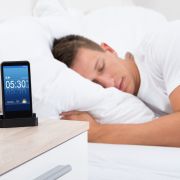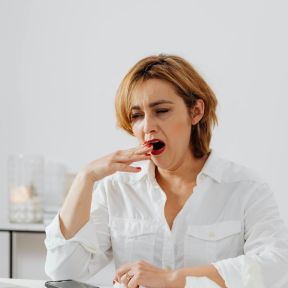How to Sleep Better
Almost everyone can benefit from more—or more restful—sleep. But in today’s fast-paced world, consistent, restorative sleep can be hard to come by. For many, it’s among the first things to be sacrificed when schedules become busier or responsibilities become overwhelming.
But the benefits of prioritizing and improving one's sleep can be vast, and doing so is often not as difficult as many people think. These strategies—of behaviors to engage in, as well as some to avoid—can help most people turn restful sleep from a distant dream into a reality.
On This Page

Engaging in healthy sleep behaviors—known collectively as “sleep hygiene”—is one of the simplest and most effective ways to improve standard sleep problems. Though the individual behaviors themselves are straightforward, sleep hygiene requires commitment, particularly when it comes to establishing a consistent bedtime ritual that will signal to the brain that it’s time to wind down. Be patient: Most experts advise sticking to a new sleep routine for several weeks before seeking additional help.
The term “sleep hygiene” refers to the behaviors, rituals, and environmental factors that can ultimately help an individual sleep better. Sleep hygiene is a broad category that encompasses the foods you eat (or avoid), exercise habits, bedtime routine, and the sleep environment itself. Typically, good sleep hygiene involves limiting alcohol and caffeine, exercising regularly, making sure the bedroom is cool and comfortable, and developing a consistent bedtime routine to train the brain and body to prepare for sleep.
Research has shown that good sleep hygiene is an effective, easy way to improve sleep in many cases. No one will sleep perfectly every night, no matter how consistent their habits. But establishing—and sticking to—a regular sleep schedule, as well as optimizing one’s sleep environment, can put someone on track for restful sleep more often than not.
Improving one’s sleep hygiene is effective in some (but not all) cases of non-optimal sleep. For the large number of people with mild to moderate sleep problems, practicing good sleep hygiene may be enough to overcome them. However, for people with chronic insomnia—consistent sleep problems lasting three months or more—or who have concurrent sleep disorders like sleep apnea, sleep hygiene alone may not be enough. Those individuals will likely need to seek professional help, either a medical doctor or a therapist who practices cognitive behavioral therapy for insomnia, or CBT-I.
The ideal bedroom temperature will be on the cooler side, and generally falls between 60 and 68 degrees. As we fall asleep, our bodies naturally drop in temperature. Keeping one's bedroom cool can help facilitate this process and has been linked to improved sleep quality.
Though most adults go to bed in the late evening or very early morning, everyone’s ideal bedtime is different and determined by their schedule, their habits, and their specific chronotype (so-called “night owls,” for instance, will prefer a later bedtime than “morning larks”). Someone's ideal bedtime is whatever allows them to get an adequate amount of sleep (typically between 7 and 9 hours) and to go about their life with minimal fatigue. It may be necessary to experiment to find the best time for your body and brain.
While it can be tempting to sleep in on the weekends, experts agree that it’s better for an individual's overall sleep quality if he or she aims to be consistent and wake up at approximately the same time each day. Sleeping past one's normal wake-up time can disrupt the circadian rhythm and make it more difficult to fall asleep the next night.
Overall, eating a healthy diet filled with vegetables, fruits, whole grains, and lean protein can help soothe the body to sleep on a regular basis. More specifically, complex carbs—found in beans, whole grains, and many vegetables—can help stave off blood sugar spikes and crashes that can interfere with sleep, and may help the body absorb key vitamins (like Vitamin B or tryptophan) that promote restorative rest. Eating fruits that contain melatonin, like bananas, pineapples, or oranges, may also help the body regulate sleep. Foods that are high in tryptophan, such as eggs, nuts, tofu, and poultry, may also help someone get better rest.

While implementing positive sleep habits and consistent bedtime routines can make a big difference in someone's sleep quantity and quality, ending negative sleep-related habits and behaviors is just as critical. While the bad habits that interrupt our sleep are different for everyone, in most cases this process will involve cutting back on food and drinks that interfere with sleep, staying away from disruptive electronic devices, and identifying and minimizing any obstacles that are preventing an individual from getting the rest they need.
On any given night, there are a number of reasons why sleep may be harder to come by. Some include: having too much to eat or drink, exercising too close to bedtime, looking at screens in the evening, or feeling lingering stress from a busy day. If sleeplessness only persists for a short period of time, it’s likely not cause for alarm. If it continues for longer than four weeks—and some of the most common culprits have been addressed, with no results—it may be time to bridge the topic with a professional.
Watching TV in bed can harm sleep in a number of ways. First, the blue light emitted from many electronic devices can disrupt someone's circadian rhythm and make it harder for them to sleep, even long after the device has been shut off. If an individual falls asleep with the TV on, the light may still penetrate their eyelids and render their sleep less restful.
Second, watching TV in bed teaches the person's brain to associate their bed with the activity, which may interfere with the association between the bed and sleep. In an ideal world, someone's bed should only be used for what experts call “the 3 S’s”: sleep, sex, and sickness. Any other in-bed activity can change the unconscious meaning the brain assigns to their bed.
It’s very possible. Studies have shown that people who use their phone or tablet in bed struggle to wind down, take longer to fall asleep, and feel more tired and less alert when they wake up. Like a television, smartphones and tablets emit blue light that disrupts circadian rhythm and interferes with melatonin production. Most experts recommend putting phones and other devices away at least an hour before bedtime.
Some evidence suggests that sharing a bed—though standard practice for most cohabitating couples—may disrupt the sleep of one or both partners. Excessive nighttime movement, snoring, or conflicting work schedules may exacerbate the issue. One recent study found that women may bear the brunt, and have more trouble sleeping when sharing a bed; other recent evidence has found that some couples have decided to pursue so-called “sleep divorces” and no longer spend their nights in the same bed.
But many couples can and do sleep effectively together, and sleeping in the same bed may have significant benefits for their emotional and sexual connection. Each individual couple will need to determine the best sleeping arrangement for them.
It may. Caffeine can take as long as 12 hours to exit the system, so any afternoon pick-me-ups have the potential to disrupt sleep later on—either by making it harder to fall asleep, or by making any sleep that does occur less restful. Someone who struggles to sleep at night should consider restricting their consumption of caffeinated food and drinks—including coffee, tea, chocolate, and soda—to the morning. If the "afternoon slump" is a concern, going for a walk outside—particularly in an environment exposed to bright sunlight—can be a natural energy-booster.
Alcohol can make someone sleepy and may make them drop off faster—which is why many people who struggle to fall asleep reach for a drink before turning in. But drinking before bed is a double-edged sword. Alcohol also suppresses the body’s ability to enter REM sleep, which may leave the individual feeling groggy and poorly rested upon waking. What’s more, alcohol disrupts the body’s circadian rhythm which, in addition to hindering sleep, can interfere with digestion, mood, and more.
It can be—but only if it's done the wrong way. Well-timed naps have been shown to increase alertness, improve concentration, and aid in decision-making. But napping for too long can result in feeling groggy and grumpy upon waking, and lengthy naps can interfere with someone's ability to fall asleep at night. Those who already struggle with insomnia are advised to avoid napping, as it can exacerbate their already-disrupted circadian rhythm.














